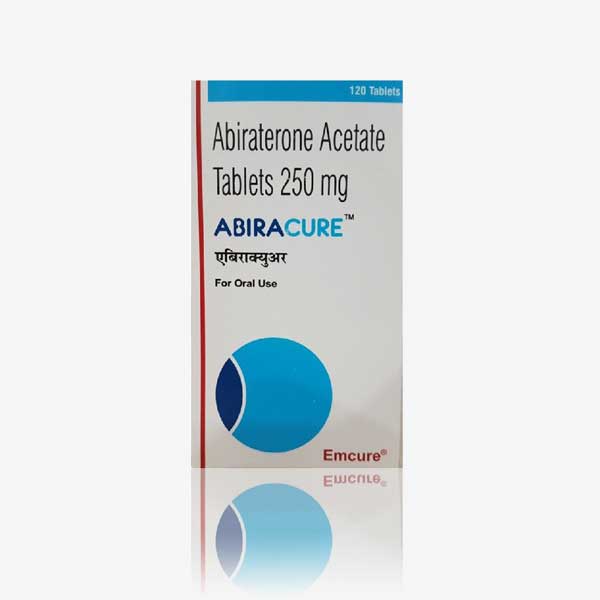- Your cart is empty
- Continue Shopping

Product
Buy Abiracure : Abiraterone 250 mg Tablets 120’S Online
$243.42
Brand Name : Abiracure
International Brand Name : Zytiga
Composition : Abiraterone Acetate
Manufactured by : Emcure Pharmaceuticals Ltd.
Strength : 250 mg
Form :Tablets
Packing :Pack of 120 Tablets
Prescription Required *
Abiraterone is a medication used in the treatment of advanced prostate cancer. It is classified as a hormonal therapy and specifically functions as an androgen biosynthesis inhibitor. Abiraterone is commonly prescribed for metastatic castration-resistant prostate cancer (mCRPC), a stage of prostate cancer that has spread and is no longer responsive to traditional hormone therapy.
Key Characteristics and Information about Abiraterone:
- Mechanism of Action: Abiraterone works by inhibiting an enzyme called CYP17, which is crucial for the production of androgens (male hormones) in the adrenal glands and the tumor tissues. By blocking androgen production, abiraterone aims to reduce the fuel that fuels the growth of prostate cancer cells.
- Indications: Abiraterone is primarily used in the treatment of metastatic castration-resistant prostate cancer (mCRPC). It may be prescribed in combination with prednisone or prednisolone.
- Treatment Stage: Abiraterone is typically used when prostate cancer progresses despite initial hormone therapy (androgen deprivation therapy or ADT). It is often used in later stages of the disease when cancer cells become resistant to other forms of hormonal treatment.
- Administration: Abiraterone is usually taken orally in the form of tablets, and it is recommended to be taken on an empty stomach or with a low-fat meal. It is commonly taken once a day.
- Monitoring and Side Effects: Patients undergoing treatment with abiraterone are regularly monitored for potential side effects, and adjustments to treatment may be made based on individual responses. Common side effects may include fatigue, hypertension, fluid retention, and changes in liver function.
- Precautions: Abiraterone is generally not recommended for use in women, especially pregnant women, due to the risk of harm to the developing fetus. It may also interact with certain medications, and healthcare providers will consider the patient’s overall health and medical history before prescribing.
- Consultation with a Healthcare Provider: Before starting abiraterone, individuals should have a thorough discussion with their healthcare provider to assess its suitability for their specific case. The healthcare provider will consider factors such as the stage of cancer, overall health, and potential interactions with other medications.
- Efficacy: Clinical trials have demonstrated the efficacy of abiraterone in extending survival and delaying disease progression in individuals with metastatic castration-resistant prostate cancer.
It’s important to note that medical information is subject to change, and the latest guidance should be obtained from healthcare professionals or official prescribing information. Patients should always consult with their healthcare provider for personalized advice and treatment recommendations.














Reviews
There are no reviews yet.